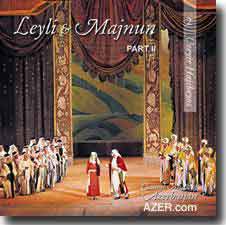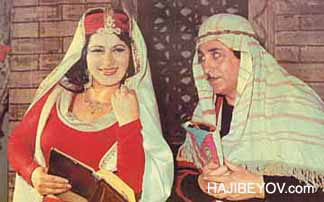|

Autumn 2001 (9.3)
Page
56
Leyli &
Majnun
  
Purchase
Hajibeyov CDs at AI
Store
First Opera (1908)
The premiere of the opera "Leyli and Majnun" took place
on January 12, 1908, in the Taghiyev Theater in Baku. The work
became identified as the "First Opera of the Muslim East".
The plot, based on an immortal love story, can best be compared
to "Romeo and Juliet," though in oral tradition the
legend of "Leyli and Majnun" predates Shakespeare by
more than a thousand years.
Uzeyir Hajibeyov (1885-1948) was the composer of this opera.
He was 22 at the time of its premiere. He and his younger brother,
Jeyhun (1891-1962), wrote the libretto based on the poetic rendition
of "Leyli and Majnun" by Azerbaijani poet Fuzuli (1480-1562).
Many of the verses were kept in their original form.
  Left: Zeynab Khanlarova and Arif Babayev in
the roles of Leyli and Majnun Left: Zeynab Khanlarova and Arif Babayev in
the roles of Leyli and Majnun
The
idea for the opera can be traced to the boys' childhood in their
hometown of Shusha [under occupation by Armenian military forces
since 1992]. In 1898, there had been an amateur dramatization,
and the brothers had sung together in a boys' chorus interpreting
the song of Majnun at Leyli's graveside. The experience had a
profound effect on them.
Staging Difficulties
Hajibeyov used to talk about the difficulties - both financial and creative
- that they encountered
in staging "Leyli and Majnun". Rehearsals took place
at the Hotel Islamiyya, the home of the composers and the residence
of Imran Gasimov, who was the only one to offer them financial
support.
One of the greatest obstacles was that there was no serious performing
culture in Baku at the time. There were no professional actors
or singers. None had been trained professionally; few could read
music. It wasn't easy to find vocalists who could perform the
leading roles for the two-hour production. Quite by chance, Hajibeyov
stumbled upon various individuals and persuaded them to take
major roles.
The first was Huseingulu Sarabski (1879-1945), who worked at
a water distribution center not far from Hotel Tabriz, where
Uzeyir was living. One day he heard the young man singing as
he worked. It wasn't long before he tapped him for the lead role
of Majnun.
But the female role of Leyli was much more difficult to fill.
Religious tradition did not allow women to perform on stage,
and no man wanted to take the part. As the story goes, one day
Hajibeyov was sitting in a "chaykhana" (tea house)
when a tall, good-looking waiter, A. Farajev, approached his
table bringing tea. Again, he just happened to be singing at
his work. But this time, it took a great deal more persuasion
to get him to consent to the role.
"Leyli and Majnun" is not a typical opera in the European
sense of the word, as it is based on traditional Azerbaijani
mughams, which are performed in their original form - meaning
unwritten and improvised. Entire segments of the opera feature
specific mughams, depending on the emotional effect the composer
was trying to convey. The mughams called Mahur-Hindi, Segah,
Chahargah, Kurd-Shahnaz, Bayati-Shiraz, Shushtar, Bayati-Kurd,
Shabi-Hijran and Gatar are among those featured in this opera.
Another innovation of this work was that it included choral harmonic
music, which is not an indigenous characteristic of Azerbaijani
music. The chorus was used to move the plot along, comment on
events and reflect on the psychological state of the main characters.
The chorus was accompanied by a symphonic orchestra - another new feature.
The premiere was not without its last-minute glitches. Two hours
before the show, Uzeyir had to rewrite some of the music for
the violins, and when the two tar players didn't show up, he
himself went down into the orchestra pit to play the violin.
Ramazan Khalilov (1900-1998), who later became Uzeyir's assistant
and the Director of the Hajibeyov Home Museum, recalled that
first performance in 1908. He was seven years old at the time.
He remembered complaining to his mother about the dark netting
that had been draped across the balconies where they were sitting,
which obscured their view of the stage. His mother explained
that the nets kept the men who were seated below on the theater's
main floor from being able to see the women. They were just part
of the Muslim tradition of the day.
Despite all the difficulties in staging the premiere, Hajibeyov
viewed the opera as a success. He felt that the public was hungry
for dramatic enactments of classic scenes accompanied by folk
music. The opera has survived and is dearly loved in Azerbaijan
today. It is viewed as one of the most significant contributions
of Hajibeyov's musical legacy. Sound samples at AZER.com, AI
Store.
From Azerbaijan
International
(9.3) Autumn 2001.
© Azerbaijan International 2001. All rights reserved.
Back to Index
AI 9.3 (Autumn 2001)
AI Home
| Magazine
Choice
| Topics
| AI Store | Contact us
Other Web sites
created by Azerbaijan International
AZgallery.org | AZERI.org | HAJIBEYOV.com
|